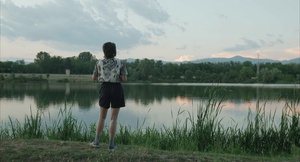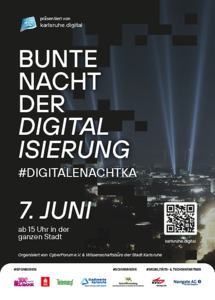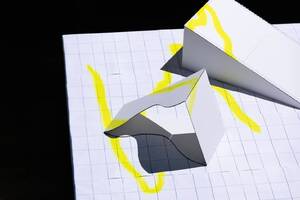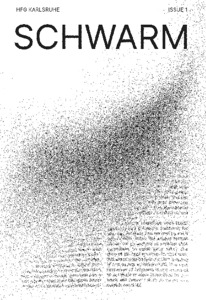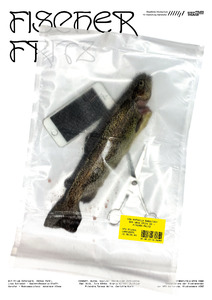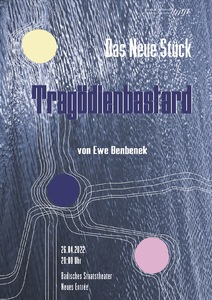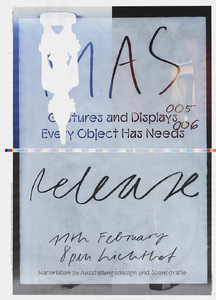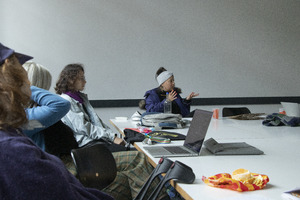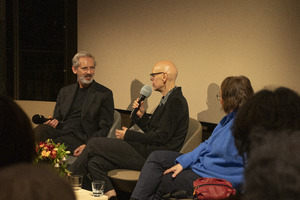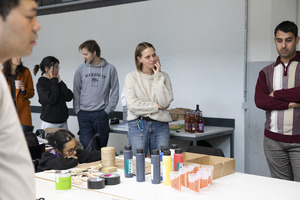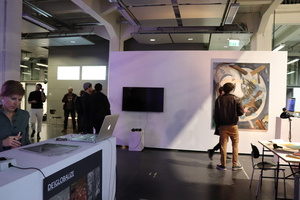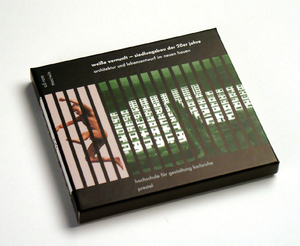rOundabOut
Benachbarte Sets (63)Alle Zusammenhänge anzeigen
Diese Sets wurden den gleichen Sets hinzugefügt wie das ausgewählte Set.
63 Inhalte
- Seite 1 von 6
Geography is destiny
- Titel
- Geography is destiny
- Titel (en)
- Geography is destiny
- Autor/in
- Beschreibung (de)
- In einem bulgarischen Tal, in dem die Produktion von Rosen und Waffen das Klima des Lebensraums bestimmt, begibt sich die Autorin des Films auf eine Identitätssuche, eine Reise entlang der bipolaren, psychogeografischen Realität ihres Geburtsorts.
- Beschreibung (en)
- In a Bulgarian valley where the production of roses and weapons determines the climate of the living environment, the film’s author takes off on an identity quest, a journey along the bipolar, psychogeographic reality of her birthplace.
- Typ des Projekts/Werks
- Schlagworte
- Datierung
- 01.09.2023
- Mitwirkende
- Dank an
- Sprache
- Untertitel (Film)
- Technik/Verfahren/Formate
- dcp
- Dauer
- 75min.
- Ort: Institution
- Ort
- Blauer Salon
- Stadt
- Land
- Bemerkungen
- The film copy will be archived at the Film Archiv of HFG. Current contact person as per 2023 - Philip Lawall
- Titel
- Geography is destiny
- Projektleiter/in
- Semester
- Studiengang
- Typ der Abschlussarbeit
- Importiert am
- 26.09.2023
- Übergeordnete Sets
- 2
- Set enthält
- 0 3
Bunte Nacht der Digitalisierung 2024
- Titel
- Bunte Nacht der Digitalisierung 2024
- Titel (en)
- Colourful Night of Digitalization 2024
- Beschreibung (de)
- Am 7. Juni findet die Bunte Nacht der Digitalisierung statt, ein Festival, das die Vielfalt der Perspektiven und Herausforderungen der Digitalisierung in Karlsruhe feiert. Diese Initiative öffnet den Karlsruher Bürgern die Türen von mehr als 60 Institutionen (Bibliotheken, Museen, Universitäten, Unternehmen, Bürgerinitiativen), um verschiedene Themen und Ansätze zur Digitalisierung zu zeigen und zu diskutieren.
- Beschreibung (en)
- On June 7th, the Colourful Night of Digitization, a festival to celebrate the diversity of perspectives and challenges on digitization that exists in Karlsruhe, will take place. This initiative opens the doors of more than 60 institutions (libraries, museums, universities, enterprises, civil initiatives) to the citizens of Karlsruhe to show and discuss diverse topics and approaches to digitality.
- Typ des Projekts/Werks
- Schlagworte
- Datierung
- 07.06.2024
- Mitwirkende
- Ort: Institution
- Ort
- Hochschule für Gestaltung: 112
Kronenplatz;
Werkstatt und Studio von Triangel
- Hochschule für Gestaltung: 112
- Stadt
- Land
- Beteiligte Institution(en)
- Internetlinks
- Titel
- Bunte Nacht der Digitalisierung 2024
- Importiert am
- 05.06.2024
- Übergeordnete Sets
- 1
- Set enthält
- 3 1
Roll a boulder
- Titel
- Roll a boulder
- Titel (en)
- Roll a boulder
- Autor/in
- Beschreibung (de)
- In diesem Stück erkunde ich die Sinnlosigkeit des Lebens durch die Verschmelzung von Skateboarding und greife dabei auf das Bildnis des Sisyphos aus der griechischen Mythologie zurück, das den Felsen schiebt. Ich habe einen Raum von 8*5 Metern konstruiert, umgeben von Skateboard-Soundeffekten unten und Projektion Animationen oben. Die Trajektorie des Skateboards schreitet kontinuierlich voran, dreht sich und scheitert letztendlich auf dem Gelände, ähnlich wie Sisyphos, der endlos den Felsen schiebt und in einem unendlichen Zyklus von Anstrengung und Scheitern gefangen ist.
Die lebendigen animierten Skateboard-Spuren vermitteln Spannung und surreale visuelle Ausdrücke. Die Anstrengung des Skateboardens entspricht dem endlosen Rollen des Felsens und regt zur Reflexion über die Bedeutung des Lebens an. Zuschauer reflektieren in dieser Umgebung kontinuierlich über die Vergänglichkeit des Lebens und die Bedeutung von Anstrengung, was die widersprüchlichen Gefühle der Menschheit gegenüber dem Dasein widerspiegelt. Diese Szene ist nicht nur eine visuelle Freude, sondern dient auch als spirituelle Erleuchtung und Reflexion.
- In diesem Stück erkunde ich die Sinnlosigkeit des Lebens durch die Verschmelzung von Skateboarding und greife dabei auf das Bildnis des Sisyphos aus der griechischen Mythologie zurück, das den Felsen schiebt. Ich habe einen Raum von 8*5 Metern konstruiert, umgeben von Skateboard-Soundeffekten unten und Projektion Animationen oben. Die Trajektorie des Skateboards schreitet kontinuierlich voran, dreht sich und scheitert letztendlich auf dem Gelände, ähnlich wie Sisyphos, der endlos den Felsen schiebt und in einem unendlichen Zyklus von Anstrengung und Scheitern gefangen ist.
- Beschreibung (en)
- In this piece, drawing upon the imagery of Sisyphus from Greek mythology pushing the boulder, I explore the meaninglessness of life through the fusion of skateboarding. I constructed a space measuring 8*5 meters, enveloped in skateboard sound effects below and projection animations above. The skateboard's trajectory continually progresses, turns, and ultimately fails on the terrain, resembling Sisyphus endlessly pushing the boulder, caught in an infinite cycle of effort and failure.
The vibrant animated skateboard tracks convey tension and surreal visual expressions. The effort of skateboarding parallels the endless rolling of the boulder, prompting contemplation on the meaning of life. Spectators continually ponder the transience of life and the significance of effort in this setting, reflecting humanity's contradictory feelings towards existence. This scene is not just a visual delight but also serves as a spiritual enlightenment and reflection.
- In this piece, drawing upon the imagery of Sisyphus from Greek mythology pushing the boulder, I explore the meaninglessness of life through the fusion of skateboarding. I constructed a space measuring 8*5 meters, enveloped in skateboard sound effects below and projection animations above. The skateboard's trajectory continually progresses, turns, and ultimately fails on the terrain, resembling Sisyphus endlessly pushing the boulder, caught in an infinite cycle of effort and failure.
- Typ des Projekts/Werks
- Schlagworte
- Datierung
- 18.01.2024
- Mitwirkende
- Dank an
- Sprache
- Material
- Abmessungen
- 8m x 5m
- Dauer
- 1 Tag
- Ort: Institution
- Ort
- Lichthof
- Stadt
- Land
- Titel
- Roll a boulder
- Projektleiter/in
- Semester
- Studiengang
- Typ der Abschlussarbeit
- Importiert am
- 15.04.2024
- Übergeordnete Sets
- 2
- Set enthält
- 0 12
SCHWARM 1
- Titel
- SCHWARM 1
- Titel (en)
- SCHWARM 1
- Autor/in
- Typ des Projekts/Werks
- Datierung
- 2023
- Mitwirkende
- Sprache
- Ort: Institution
- Titel
- SCHWARM 1
- Importiert am
- 08.03.2024
- Übergeordnete Sets
- 1
- Set enthält
- 0 17
DNS #69
- Titel
- DNS #69
- Untertitel
- Fischer Fritz
- Autor/in
- Beschreibung (de)
- Frische Fische kann Fischer Fritz nicht mehr fischen. Nicht erst seit seinem Schlaganfall. Sein Sohn Franz ist kein Fischer geworden, sondern Frisör in der Großstadt. Um den Vater zu versorgen hat er eine ausländische Pflegekraft engagiert. Ein Sprechtheater nennt die Autorin Raphaela Bardutzky ihr Stück, das bei den Autor*innentheatertage 2022 am Deutschen Theater in Berlin ausgezeichnet wurde. Sprachlich virtuos, tragisch-komisch und spielerisch leicht erzählt sie von Heimat und Fremde, Sehnsucht und Einsamkeit, Stadt und Land, Alter und Jugend. Im Anschluss findet ein Gespräch mit der Autorin Raphaela Bardutzky statt.
- Beschreibung (en)
- Fisherman Fritz can no longer catch fresh fish. Not just since his stroke. His son Franz has not become a fisherman, but a hairdresser in the big city. He has hired a foreign carer to look after his father. Author Raphaela Bardutzky calls her play, which won an award at the Autor*innentheatertage 2022 at the Deutsches Theater in Berlin, spoken theater. With virtuoso language, tragic-comic and playful lightness, it tells of home and foreignness, longing and loneliness, city and country, age and youth. This will be followed by a discussion with the author Raphaela Bardutzky.
- Typ des Projekts/Werks
- Schlagworte
- Datierung
- 04.02.2023
- Mitwirkende
- Sprache
- Ort: Institution
- Ort
- Großes Studio
- Stadt
- Land
- Beteiligte Institution(en)
- Titel
- DNS #69
- Projektleiter/in
- Semester
- Studiengang
- Lehrveranstaltung
- Importiert am
- 20.12.2023
- Übergeordnete Sets
- 1
- Set enthält
- 0 10
DNS #68
- Titel
- DNS #68
- Untertitel
- Tragödienbastard
- Autor/in
- Beschreibung (de)
- Es ist ein Akt der Emanzipation. Das mit dem Mühlheimer Dramatikerpreis gekrönte Stück erzählt in einem rhythmisch tobenden Redestrom davon, wie sich die Tochter polnischer Einwanderer und ihre „chosen sisters“ von der Last des Migrationsnarrativs befreien und zu dem werden, was sie eigentlich immer waren: Göttinnen.
Das Stück “Tragödienbastard” von Ewe Benbenek wurde im Wintersemester 2021/2022 im Rahmen des Seminars ‘Das neue Stück’ von Studierenden technisch und künstlerisch erarbeitet und in eine knapp zweistündige szenische Lesung umgesetzt. Das Projekt wurde von Constanze Fischbeck, Anna Haas und Eivind Haugland betreut sowie von Sandra Blatterer, welche in einem einwöchigen Lichtworkshop spannende Impulse zur Erarbeitung des Licht- und Bühnenkonzepts gab.
Im Anschluss an die szenische Lesung findet ein Nachgespräch mit der Autorin Ewe Benbenek und den Mitwirkenden statt.
- Es ist ein Akt der Emanzipation. Das mit dem Mühlheimer Dramatikerpreis gekrönte Stück erzählt in einem rhythmisch tobenden Redestrom davon, wie sich die Tochter polnischer Einwanderer und ihre „chosen sisters“ von der Last des Migrationsnarrativs befreien und zu dem werden, was sie eigentlich immer waren: Göttinnen.
- Beschreibung (en)
- It is an act of emancipation. The play, which was awarded the Mühlheim Dramatist Prize, tells the story of how the daughter of Polish immigrants and her "chosen sisters" free themselves from the burden of the migration narrative in a rhythmically raging stream of speech and become what they actually always were: Goddesses.
The play "Tragödienbastard" by Ewe Benbenek was technically and artistically developed by students in the winter semester 2021/2022 as part of the seminar 'Das neue Stück' and transformed into a staged reading lasting almost two hours. The project was supervised by Constanze Fischbeck, Anna Haas and Eivind Haugland as well as Sandra Blatterer, who gave exciting impulses for the development of the lighting and stage concept in a one-week lighting workshop.
The staged reading will be followed by a discussion with the author Ewe Benbenek and the participants.
- It is an act of emancipation. The play, which was awarded the Mühlheim Dramatist Prize, tells the story of how the daughter of Polish immigrants and her "chosen sisters" free themselves from the burden of the migration narrative in a rhythmically raging stream of speech and become what they actually always were: Goddesses.
- Typ des Projekts/Werks
- Schlagworte
- Datierung
- 26.04.2022
- Mitwirkende
- Sprache
- Dauer
- 2 Stunden
- Ort: Institution
- Ort
- neues Entrée
- Stadt
- Land
- Beteiligte Institution(en)
- Titel
- DNS #68
- Projektleiter/in
- Semester
- Studiengang
- Lehrveranstaltung
- Importiert am
- 20.12.2023
- Übergeordnete Sets
- 1
- Set enthält
- 0 9
MAS
- Titel
- MAS
- Autor/in
- Beschreibung (de)
- "Materialien zu Ausstellungsdesign und Szenografie" ist eine neue Publikationsreihe des Fachbereichs Ausstellungsdesign und Szenografie der HfG Karlsruhe. Sie setzt sich mit der Gestaltung von narrativen Räumen als kritischer Designpraxis auseinander. Materialien zu Ausstellungsdesign und Szenografie ist als fortlaufende Materialsammlung angelegt, in der Beiträge zu Diskussionen in unserem Fachgebiet zusammengetragen und zugänglich gemacht werden. Wir betrachten die einzelnen Ausgaben als Ausstellungsräume und die bedruckten Seiten als Displays. Dabei geht es uns nicht vorrangig um die Produktion neuer Beiträge sondern um bestehende Materialien, die durch ihre Auswahl, Kombination, Kontextualisierung oder Kommentierung, sowie ihre gestaltete Darstellung in Printform neue Zusammenhänge und Perspektiven herstellen.
- Beschreibung (en)
- "Materials on Exhibition Design and Scenography" is a new publication series from the Department of Exhibition Design and Scenography at the HfG Karlsruhe. It deals with the design of narrative spaces as a critical design practice. Materials on Exhibition Design and Scenography is designed as an ongoing collection of material in which contributions to discussions in our field are compiled and made accessible. We view the individual issues as exhibition spaces and the printed pages as displays. We are not primarily concerned with the production of new contributions, but rather with existing materials that create new contexts and perspectives through their selection, combination, contextualization or commentary, as well as their designed presentation in print form.
- Typ des Projekts/Werks
- Schlagworte
- Sprache
- Technik/Verfahren/Formate
- DinA 4
- Ort: Institution
- Stadt
- Land
- Bemerkungen
- Seit 2016
Heft 1: Judith Barry
Heft 2: Stanislaw Zamecznik
Heft 3: László Moholy-Nagy
Heft 4: Jan van Toorn
Heft 5: Gestures and Displays
- Seit 2016
- Titel
- MAS
- Projektleiter/in
- Lehrveranstaltung
- Importiert am
- 14.12.2023
- Übergeordnete Sets
- 1
- Set enthält
- 6 1
Literatursalon HfG - ZKM
- Titel
- Literatursalon HfG - ZKM
- Titel (en)
- Literatursalon HfG - ZKM
- Autor/in
- Typ des Projekts/Werks
- Schlagworte
- Datierung
- 26.10.2023
- Ort: Institution
- Ort
- Media Lounge, R. 112
- Stadt
- Land
- Beteiligte Institution(en)
- Titel
- Literatursalon HfG - ZKM
- Importiert am
- 28.11.2023
- Übergeordnete Sets
- 1
- Set enthält
- 1 0
Vom Nutzen der Kunst
- Titel
- Vom Nutzen der Kunst
- Titel (en)
- On the benefits of art
- Autor/in
- Beschreibung (de)
- In der gemeinsamen Gesprächsreihe "Vom Nutzen der Kunst" von ZKM und HfG, laden wir internationale Gäste aus Philosophie, Literatur und Kunst zum offenen Austausch mit den Hochschulangehörigen, den Mitarbeitenden des ZKM und der Karlsruher Bevölkerung ein.
- Beschreibung (en)
- In the joint series of talks between ZKM and HfG, we invite international guests from the fields of philosophy, literature and art to an open exchange with members of the university, ZKM staff and the people of Karlsruhe.
- Typ des Projekts/Werks
- Schlagworte
- Datierung
- 16.11.2023
- Ort: Institution
- Ort
- Media Lounge
- Stadt
- Land
- Titel
- Vom Nutzen der Kunst
- Importiert am
- 28.11.2023
- Übergeordnete Sets
- 1
- Set enthält
- 2 0
PRESENT TENSE Working in Critical Times
- Titel
- PRESENT TENSE Working in Critical Times
- Titel (en)
- PRESENT TENSE Working in Critical Times
- Untertitel
- Symposium des Kunstbüros der Kunststiftung Baden-Württemberg
- Autor/in
- Beschreibung (de)
- „Present Tense” beschäftigt sich mit unserer unmittelbaren Gegenwart: Wir leben in einer komplexen, krisenhaften Zeit, in der die Überlagerung von Klima- und Energiekrise, Postpandemie, Prekarität und Konkurrenz, gesellschaftlicher Radikalisierung bis hin zu näher rückenden Kriegen bereits jetzt gravierende Auswirkungen auf unser Leben und Arbeiten hat. Die Anspannung steigt, wir stehen vor dringlichen gesamtgesellschaftlichen Aufgaben und bewegen uns zugleich in Richtung eines Zustands chronischer Erschöpfung. Das etablierte Kunstfeld und die künstlerische und kulturelle Produktion sind davon nicht ausgenommen. Mit Künstler:innen, Kurator:innen und anderen Expert:innen des kulturellen Feldes möchten wir den Blick auf die aktuelle künstlerische Produktion und Ausstellungspraxis richten und die Frage nach möglichen (Zukunfts-)perspektiven für das Kunstfeld diskutieren:
Welche gesellschaftliche Rolle können und müssen Kunst und ihre Produzent:innen in einer sich radikal verändernden Welt einnehmen? Wie können Kunst- und Kulturinstitutionen zu Orten aktiver gesellschaftlicher Transformation werden? Was bedeutet es, eine (ökologisch wie sozial) nachhaltige künstlerische und institutionelle Praxis in der digitalen Gegenwart zu entwickeln? Welche neuen Gemeinschaften brauchen wir, gerade im Hinblick auf die zunehmende gesellschaftliche Spaltung und Radikalisierung? Offensichtlich führt die krisenhafte Gegenwart u. a. dazu, dass sich Menschen nach autoritären Figuren und Programmen sehen – eine Aufgabe von Kunst und Kultur könnte es sein, andere, freiere Konzepte von Zukunft zu entwerfen.
Auch das Konzept der Fürsorge in der künstlerischen und kuratorischen Praxis wird Thema der Veranstaltung sein. Teil des Symposiums sind neben Vorträgen künstlerische Workshops, Interventionen und Performances, die wir als gleichwertige Formen der Wissensproduktion und -vermittlung begreifen.
Mit Beiträgen von Gin Bahc, Sascia Bailer, Constanze Fischbeck, Sina Hensel, Alistair Hudson, Anne Duk Hee Jordan, Valentina Karga, Matriarchale Volksküche, Jacob Ott und Dorothee Richter.
- „Present Tense” beschäftigt sich mit unserer unmittelbaren Gegenwart: Wir leben in einer komplexen, krisenhaften Zeit, in der die Überlagerung von Klima- und Energiekrise, Postpandemie, Prekarität und Konkurrenz, gesellschaftlicher Radikalisierung bis hin zu näher rückenden Kriegen bereits jetzt gravierende Auswirkungen auf unser Leben und Arbeiten hat. Die Anspannung steigt, wir stehen vor dringlichen gesamtgesellschaftlichen Aufgaben und bewegen uns zugleich in Richtung eines Zustands chronischer Erschöpfung. Das etablierte Kunstfeld und die künstlerische und kulturelle Produktion sind davon nicht ausgenommen. Mit Künstler:innen, Kurator:innen und anderen Expert:innen des kulturellen Feldes möchten wir den Blick auf die aktuelle künstlerische Produktion und Ausstellungspraxis richten und die Frage nach möglichen (Zukunfts-)perspektiven für das Kunstfeld diskutieren:
- Beschreibung (en)
- „Present Tense” concerns itself with our immediate present: We live in a complex, crisis-filled age in which the overlapping of climate and energy crisis, post-pandemic times, precarity, social radicalisation and even impending wars already govern our lives and work. Tension is rising, we are faced with imperative responsibilities for society as a whole and are, at the same time, moving towards a state of chronic exhaustion. There is no exception for the field of arts and artistic and cultural production.
Together with artists, curators and other experts from the cultural field, we would like to examine current artistic productions and exhibition practices and discuss possibilities for the (future) perspectives of the arts. Which roles within society can and must art and its producers embrace in a radically changing world? How can art and cultural institutions become venues of active social transformation? What does it mean to develop an (ecologically as well as socially) sustainable artistic and institutional practice in the digital present? The concept of care within artistic and curatorial practices will be a topic of the event as well.
What new relationships do we need, especially in view of intensifying social division and radicalisation? Obviously, the crisis-filled present among other things leads to people looking to authoritarian figures and programmes – one of the tasks for art and culture could be to design other, more independent and free concepts of the future.
In addition to lectures and panels, the symposium will include artistic workshops, interventions and performances, which are also forms of knowledge production and dissemination that we feel to be of equal importance.
With contributions from Gin Bahc, Sascia Bailer, Constanze Fischbeck, Sina Hensel, Alistair Hudson, Anne Duk Hee Jordan, Valentina Karga, Matriarchale Volksküche, Jacob Ott and Dorothee Richter
- „Present Tense” concerns itself with our immediate present: We live in a complex, crisis-filled age in which the overlapping of climate and energy crisis, post-pandemic times, precarity, social radicalisation and even impending wars already govern our lives and work. Tension is rising, we are faced with imperative responsibilities for society as a whole and are, at the same time, moving towards a state of chronic exhaustion. There is no exception for the field of arts and artistic and cultural production.
- Typ des Projekts/Werks
- Schlagworte
- Datierung
- 26.10.2023 - 28.10.2023
- Mitwirkende
- Sprache
- Ort: Institution
- Ort
- Lichthof, R.112
- Stadt
- Land
- Beteiligte Institution(en)
- Internetlinks
- Titel
- PRESENT TENSE Working in Critical Times
- Semester
- Importiert am
- 06.11.2023
- Übergeordnete Sets
- 1
- Set enthält
- 0 146
Critical Zones: An open laboratory exhibition at HfG
- Titel
- Critical Zones: An open laboratory exhibition at HfG
- Autor/in
- Beschreibung (en)
- “Critical Zones”: Developing concepts and approaches for grasping the New Climatic Regime (Bruno Latour), that is the transformations in the relations of humans to their “terrestrial” conditions of existence. – The seminar series of Bruno Latour at HfG analyses these transformations as epistemic breaks and shifts of knowledge by drawing an analogy to the scientific revolution in the 17th century, where, after a crisis of former sound knowledge, new epistemic systems, representations and narrations in art, science, and religion had to be constructed and reintegrated into new dispositifs of knowledge. The project tackles an important aesthetic question, which overpasses simple forms of illustration of knowledge: How central is the imaginary capacity of the arts in constructing representations and narrations that are depictions and “generators” of new knowledge systems and therefore vital means of cultural change?
The exhibition at HfG in November will display some preliminary results of the projects developed by the seminar participants. It presents an opportunity to discuss – in a mode of work-in-progress – research questions, aesthetic approaches and epistemic experiments with colleagues and students of HfG and ZKM.
Opening: Nov 7, 19:00; duration: Nov 8, 10:00-19:00, Nov 9, 10:00-15:00
HfG, mittlere Lichtbrücke
- “Critical Zones”: Developing concepts and approaches for grasping the New Climatic Regime (Bruno Latour), that is the transformations in the relations of humans to their “terrestrial” conditions of existence. – The seminar series of Bruno Latour at HfG analyses these transformations as epistemic breaks and shifts of knowledge by drawing an analogy to the scientific revolution in the 17th century, where, after a crisis of former sound knowledge, new epistemic systems, representations and narrations in art, science, and religion had to be constructed and reintegrated into new dispositifs of knowledge. The project tackles an important aesthetic question, which overpasses simple forms of illustration of knowledge: How central is the imaginary capacity of the arts in constructing representations and narrations that are depictions and “generators” of new knowledge systems and therefore vital means of cultural change?
- Typ des Projekts/Werks
- Schlagworte
- Datierung
- 07.11.2018 - 09.11.2018
- Mitwirkende
- Ort
- Hochschule für Gestaltung Karlsruhe
- Stadt
- Land
- Beteiligte Institution(en)
- Titel
- Critical Zones: An open laboratory exhibition at HfG
- Projektleiter/in
- Semester
- Importiert am
- 17.01.2019
- Übergeordnete Sets
- 1
- Set enthält
- 0 8
weisse vernunft – siedlungsbau der 20er jahre
- Titel
- weisse vernunft – siedlungsbau der 20er jahre
- Untertitel
- architektur und lebensentwurf im neuen bauen
- Autor/in
- Beschreibung (de)
- Die CD-ROM thematisiert den modernen Siedlungsbau der 20er Jahre, der zwischen 1925 und 1931 im Rahmen des Neuen Bauens in Deutschland entstanden ist. Ausgangspunkt ist die 1929 in Karlsruhe-Rüppurr unter der künstlerischen Leitung von Walter Gropius und Otto Haesler errichtete Dammerstock-Siedlung. Sie wird hier zum Anlaß eines umfangreichen, interaktiv begehbaren und multimedial erschlossenen Rundgangs durch dieses wesentliche Kapitel der Architekturgeschichte des 20. Jahrhunderts. Die Errungenschaften und Modelle des modernen Siedlungsbaus werden nicht nur aus architektonischer und städtebaulicher Sichtweise präsentiert. Eine Reihe von Exkursionen führen darüber hinaus in das soziale, politische und kulturelle Umfeld: Aspekte wie beispielsweise der Neue Mensch und die Neue (Haus-)Frau, Architekturfotografie und Typografie, Wohnungsbaupolitik und Konstruktionsgeschichte bilden die Anknüpfungspunkte für weitgespannte thematische Bögen und inhaltliche Assoziationsketten.
- Typ des Projekts/Werks
- Schlagworte
- Datierung
- 1999
- Mitwirkende
- Sprache
- Material
- Beteiligte Institution(en)
- Titel
- weisse vernunft – siedlungsbau der 20er jahre
- Importiert am
- 24.02.2017
- Übergeordnete Sets
- 0
- Set enthält
- 0 44
